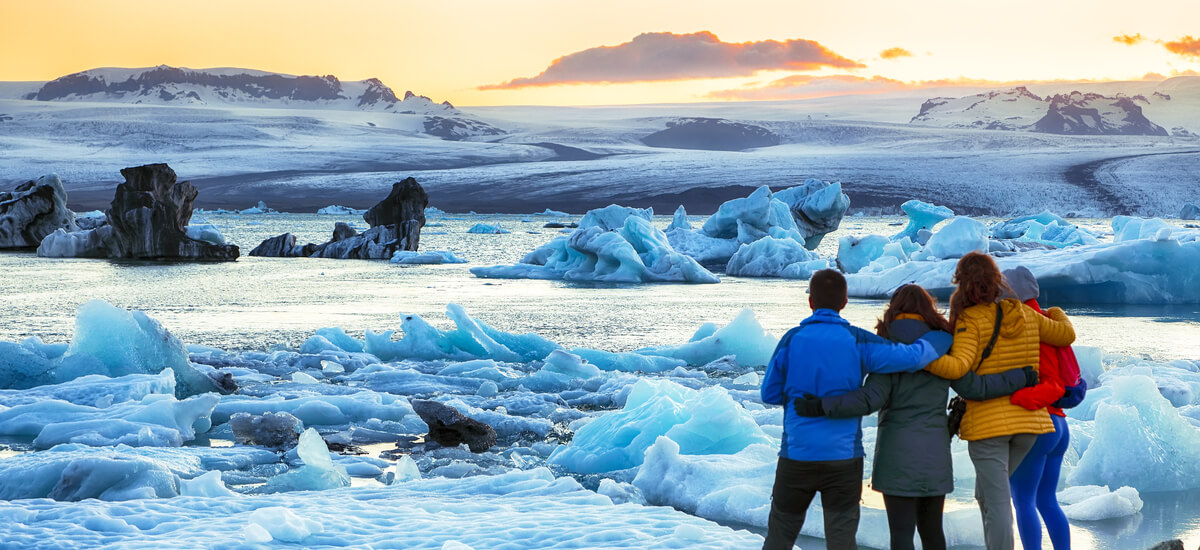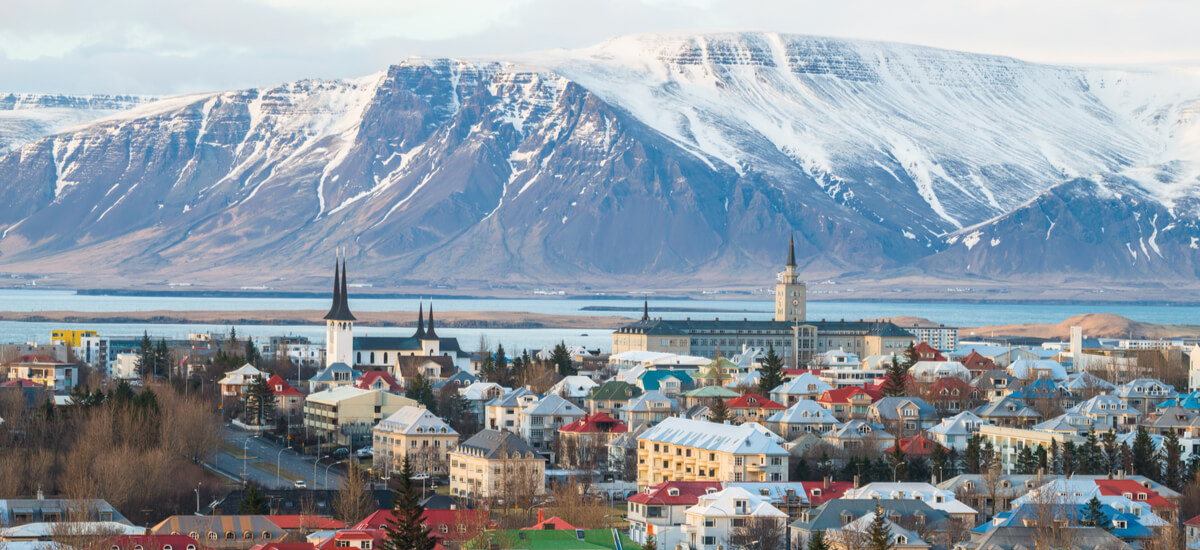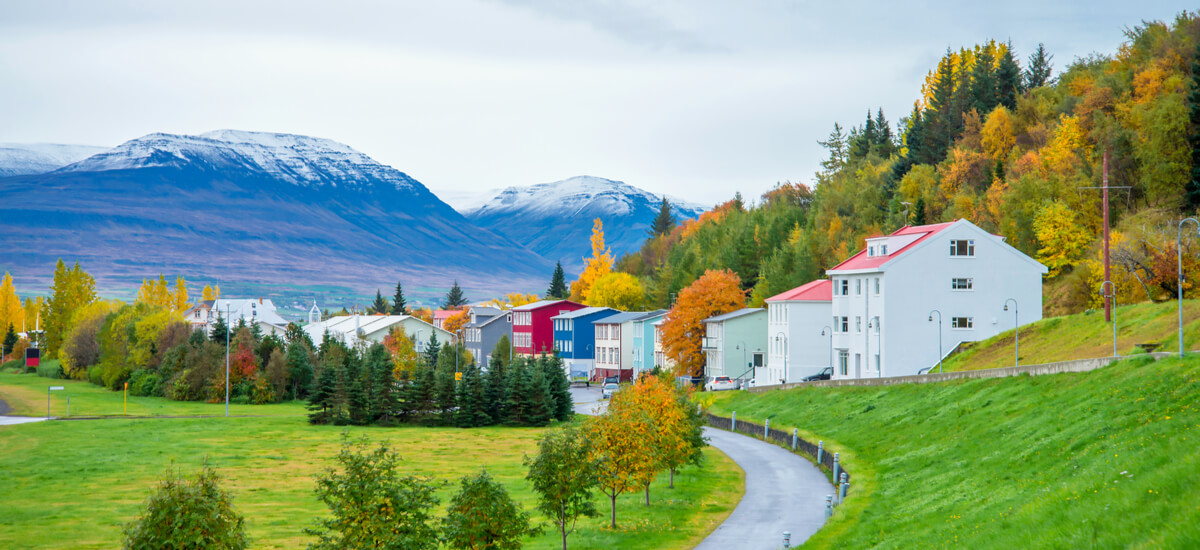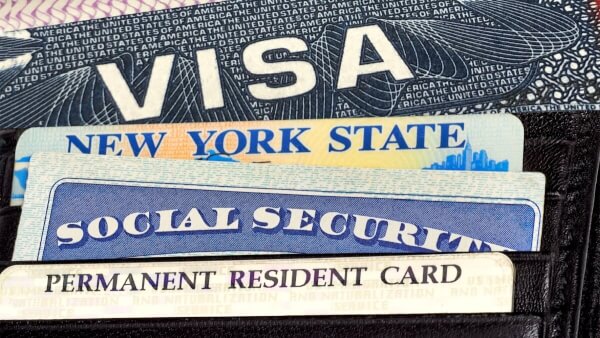Transferring your international driver's license to the US: step-by-step
Your full guide to updating your foreign driver's license to the US.

Known as the Land of Fire and Ice, Iceland is a big draw for many expats looking to live, study and work in a completely different environment. Iceland has a progressive outlook, some awe inspiring scenery and a vibrant culture — making it a great fit for people looking for a new adventure.
This guide covers things to know before moving to Iceland from the US, including answers to key questions like: how much does it cost to move to Iceland? We’ll also touch on how low cost international payments with Wise — and the Wise Multi-currency Account — can drive down the costs of living an international lifestyle.
There’s plenty more detail about moving to Iceland as an American coming right up — first let’s look at some key facts and answers to important questions like: what language do Icelanders speak?
| Capital | Reykjavik |
| Language | Icelandic |
| Population | 367,000 |
| Currency | Icelandic króna (ISK) |
| Government type | Parliamentary republic |
| Religion | Majority Christian, with some local traditional faiths also practiced |
| Weather | Possibly milder than you may expect — average winter temperatures of 32°F; summer can be 50-55°F |
You can make your dream of moving to Iceland from the US a reality.
In fact Iceland offers a fantastic experience for more adventurous expats looking to live, study or work in a new environment.
You can get a work visa if you already have a job offer in hand — or consider the remote workers visa option if you work in a location independent job. There are also some top universities if you’re planning on studying in Iceland.
You won’t usually need a visa to travel to Iceland for up to 90 days¹. If you want to move for the long term, or plan to work you’ll need to get the correct paperwork and permits in place — we’ll cover all you need to know about Iceland immigration procedures and available visas in just a moment.
It’s good to know there’s also a website all about moving to Iceland provided by the Icelandic authorities, which offers a wealth of information and resources to start your research².
|
|---|

A key consideration for many people when moving abroad with family is safety. You can rest assured that Iceland is an extremely safe country which is a great place to raise kids.
You may also worry about what there is to do in a climate which might be colder and wetter than what you’re used to at home. Here again, you may be surprised by how accessible nature is even in subpar weather, and how much there is to do indoors if you really can’t face the cold.
Education in Iceland is high quality — we’ll cover more on a few options for schooling a little later.
Considering moving to Iceland with your dog? You’ll be able to import a pet cat or dog to Iceland as long as you follow all the rules from the Icelandic Food and Veterinary Authority (MAST).
That means that when moving dogs to Iceland, or if you plan to arrive in Iceland with your cat, you’ll need an import permit, your pet must have the proper vaccinations and will also need to be in quarantine for 2 weeks on arrival.
There are tight regulations on moving live animals to Iceland — get all the details online well in advance of your planned move³.
Iceland is in the European Schengen Area which means you can visit without a visa as long as you don’t stay in Iceland or any other Schengen countries for more than 90 days in a 180 day period.
Once you’re in the Schengen area you can travel freely between Shengen countries without needing a new visa.
If you’re headed to Iceland to work, study, or stay longer than 3 months, you’ll need a visa and appropriate permit.
People headed to Iceland for employment will need to have a job in advance and will have to get a work permit through their employer. The employer is obliged to show that no locals could have fulfilled the job requirements to receive the permit.
Another interesting work option is for people who work remotely with a company which is based outside of Iceland. The remote worker’s visa offers a stay of up to 180 days for eligible applicants — giving a great way to stay in the country and work remotely with a different view.
Once you’ve lived in Iceland for 4 years you might be eligible to apply for permanent resident status. If you had an expert workers permit, or entered the country for family reunification for example, this may be a great opportunity to move towards a permanent stay in Iceland and even citizenship in future⁴.
Iceland isn’t a budget place to live. According to Numbeo’s cost of living comparison:
- Consumer prices in Iceland are 35% higher than in the US
- Restaurants are 42% more expensive in Iceland than in the US
- Groceries are 28% more expensive in Iceland than in the US
That said, rent in Iceland is on average a tiny bit (0.35%) cheaper than in the US.
Naturally, the actual cost of living in Iceland will vary widely depending on what you enjoy doing, and the sort of housing you select.
Take a more detailed look at city by city comparisons on Numbeo to build a better picture of your personal cost of living there.
Numbeo aggregates user data to give a live average cost of living in different countries and cities around the world to help you budget more accurately⁵.
When you plan your budget to move to Iceland from the US you’ll need to also take into account the costs of the move itself.
This can vary widely depending on whether you’re planning on arriving with nothing more than what you can fit in a suitcase or want to ship your entire household contents.
If you’re planning on moving a significant quantity of goods you’ll need to get quotes from international relocation agencies to see the options in terms of delivery cost and transportation time.
The Work in Iceland website recommends a few potential international shipping agencies which are worth considering.
| 🎯 These include |
|---|
There are also full details of the customs and duty rules for moving personal and household goods to Iceland, which are worth reading when you’re planning your move.
If you’re moving abroad you may need to send money to Iceland to cover your costs. You could save 3x by using Wise low cost international transfers instead of your bank.
Wise transfers are fast and secure, and can be arranged right from your laptop or mobile device for convenience. You’ll always get the mid-market exchange rate with no markup and no hidden fees to worry about.
Open a free Wise Account to hold and manage 50+ currencies, and send to 80+ countries with the mid-market exchange rate and low, transparent fees every time. See how much you can save with Wise today.
Please see Terms of Use for your region or visit Wise Fees & Pricing for the most up to date pricing and fee information
Moving to a new country is exciting — but there’s a lot to learn. If you’re thinking of moving to Iceland from America, you’ll want to do some research in advance. Here are some basics about living in Iceland to start you off.
Housing will be a major expense pretty much wherever in the world you live. If you’re planning on living in Reykjavik or another major urban area in Iceland you may find accommodation costs are on the high side. Smaller towns and rural areas are typically cheaper.
It’s also worth noting that most Icelandic people buy their own homes which leads to a small, low-key rental market in many areas. This may mean that there’s not as much choice as you might like if you plan on renting a place.
Renting a place isn’t as common in Iceland as buying a property. Some 80% of properties are privately owned, which means the rental market is fairly small.
It’s common for rental properties to be advertised in classified ads in local newspapers — although you can also get these ads online before you move to the country.
Check out the local newspaper in the area you want to live to see if you’ll be able to access property ads there. The alternatives include asking an Icelandic friend or colleague to help recommend places, and signing up with a property agent.
Under Icelandic law, you can buy real estate in Iceland if you’re domiciled there. Different provisions may apply if you’re from the EEA.
If you’re from the US and planning on buying a property in Iceland but you don't intend to live there full time you may need special permissions⁶.
The healthcare provision in cities and urban areas in Iceland is advanced. In more remote or rural areas access to healthcare facilities may be more limited¹.
Healthcare is state run and paid for through taxation. You may need to pay some fees even once you’re covered by the public health system for some medications and procedures.
Only citizens and residents of Iceland are entitled to public healthcare. You’ll need to have been in Iceland for at least 6 months to qualify.
If you’re not a resident you’ll have to pay all medical bills before you leave the hospital or clinic in which you’ve been treated. It’s important to have full medical insurance before you travel to Iceland if you don’t want to pay medical bills in full out of pocket.
When you move to Iceland you’ll probably want to open a local bank account to help manage your money, cut currency conversion costs, and get set up with utilities and services.
To open an account in Iceland you’ll usually need your Icelandic ID card, which means you can’t typically get started with this process until you arrive and register in the country.
Personal income tax is arranged on a progressive basis and can be split into municipal taxes and income taxes levied by the state. The amount you’ll pay depends on your income and runs from a total of 31% - 46%⁷.
As with any tax question, it’s worth getting professional advice when you move to Iceland from the US to make sure you’re completely clear on your obligations.
| 🌐 Moving abroad? Save money with Wise |
|---|
|
Transaction speed claimed depends on individual circumstances and may not be available for all transactions
Education in Iceland is at an extremely high standard, and compulsory between the ages of 6 and 16.
Public schools are available throughout the country, or there are a small number of international schools for families which would prefer to follow a different curriculum.
For higher education, there are 7 nationally approved universities and institutes, which offer a broad range of courses and accept students from around the world⁸.
If you choose to live in Reykjavik you’ll be able to get around many places on foot. There’s also a government operated bus system, and taxis which can be fast and convenient. As with many things in Iceland, taxis can be relatively expensive.
Hitchhiking is often also recommended as a safe way to get around in Iceland, based on the low crime rate. It’s true that tourists may choose to hitch instead of hiring a car.
However you’ll need to be aware that this is an inherently unsafe option, and even without issues related to crime, finding yourself stuck on the roadside in a rural area can lead to serious problems.
If you’re staying in Iceland for the long term you may well decide that getting a car is the most sensible way of getting around, offering independence and the opportunity to get out and about into more remote areas too.
Iceland frequently comes in the top ranks of measures of quality of life. Prosperous cities and a range of outdoor activities, great infrastructure and a warm and welcoming community make it an easy and stable place to live well.
It’s also a country that places a great importance on fairness which can mean there’s a relatively small divide in certain key areas like gender and wage equality.
Iceland has a liberal culture which welcomes diversity, leading to high levels of gender equality and an active LGBTQI community. Famously, Icelandic people publish more books per capita than any other nation, following in a long established literary tradition. You’ll also find music, drama and the arts well represented.
One interesting thing you’ll quickly notice is that Icelandic people have a different naming system compared to in the US. Instead of keeping the same family name, people will add the suffix –son (son) or –dottir (daughter) to their father’s name to create their full name. This is based on the old patronymic system and means that you’ll always hear Icelandic people addressed using both names to avoid confusion.
The Icelandic authorities provide lots of information for people who want to move to Iceland to work⁹. In many cases these include foreign experts traveling to Iceland to work in jobs they’ve already been offered — but there are also opportunities to get a visa for remote work, which may suit digital nomads and other location independent types.
If you’re headed to Iceland to work it’s good to know that levels of English are extremely high and many Icelandic people spend time internationally, giving workplaces in the country a dynamic and cosmopolitan feel. However, finding a job can take time — and is easiest if you have local connections to help point you in the right direction.
Iceland has a low crime rate, and to date has had no problems with terrorist incidents. The main problems encountered are petty crime like pickpocketing — which often occurs in the capital city and tourist areas where people may not be on their guard¹.
Police support in the cities is good but it’s worth knowing that coverage in rural areas may not be as comprehensive and paid police are backed up by local volunteers in some areas.
Stay safe from petty crime by following common sense steps as you would at home — don’t carry valuables unless absolutely necessary, and remain aware of your surroundings at all times.
Where you live in Iceland will dictate the type of lifestyle you can access — and the costs. Here are a few popular expat options.

The capital of Iceland and home to around half of all the residents of the country. Reykjavik is colorful, vibrant and full of culture. Tourists arrive to enjoy the city and access the more rural areas beyond the city all year round, meaning it’s a cosmopolitan and fun place to be whether the weather. Costs of living here are high, but it’s also where there are most jobs to be found.

Known as the heart of Viking culture, Hafnarfjörður is the third largest town in Iceland and another big tourist draw.
There are festivals year round to welcome visitors from around the world, again creating a fun atmosphere and plenty of work for people in the tourism industry. You’ll be close to the capital too, making it easy to get a quick change of scene whenever you want it.

If you’re heading to Iceland to explore the great outdoors this may be a good option. Outdoor activities on offer include skiing, bird watching, horseback riding and fishing — while there’s also plenty going on for those who love their culture.
If you need any other reason to check out Akureyri, it’s also a great place to base yourself if you want to see the Northern Lights.
Let’s close out with a quick summary of some of the advantages and disadvantages of moving to Iceland from the US.
| Pros | Cons |
|---|---|
|
|
Iceland is an appealing country for expats who want a completely out of this world experience.
Life in Iceland is nothing like what you’ll be used to at home, from the climate and scenery to the festivals, culture and food. Perfect if you’re looking for a new adventure.
If you’re considering making the leap and moving to Iceland as an American don’t forget to look at low cost international payments from Wise — and the Wise Multi-currency Account — as good ways to cut the costs of moving and living a life overseas.
Sources:
Sources checked on 01.20.2022
*Please see terms of use and product availability for your region or visit Wise fees and pricing for the most up to date pricing and fee information.
This publication is provided for general information purposes and does not constitute legal, tax or other professional advice from Wise Payments Limited or its subsidiaries and its affiliates, and it is not intended as a substitute for obtaining advice from a financial advisor or any other professional.
We make no representations, warranties or guarantees, whether expressed or implied, that the content in the publication is accurate, complete or up to date.

Your full guide to updating your foreign driver's license to the US.

Stretch your dollars when studying abroad, use Wise.

Everything you need to know about international schools in Manila, Philippines.

Selling property abroad? Check out our guide to maximize returns with these strategies from experienced tax specialists.

Understanding the best study abroad scholarship opportunities for US citizens.

Get ready to study abroad with our guide.